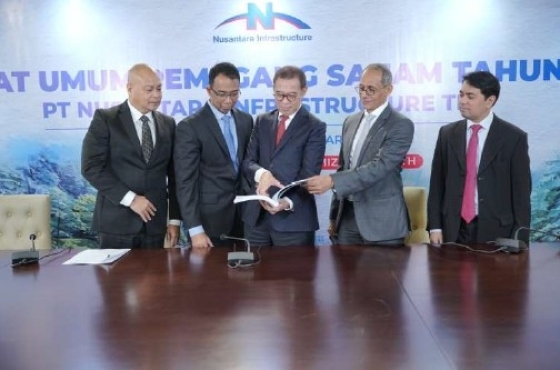echo1
 May
2025
May
2025
Momentum itu diumumkan dalam Rapat Umum Pemegang Saham Tahunan (RUPST) yang digelar secara hybrid pada Rabu, 28 Mei 2025. Selain mengesahkan laporan keuangan dan agenda rutin lainnya, pemegang saham juga menyetujui perubahan penting dalam jajaran Direksi dan Komisaris.
Luis Soriano Reñon resmi diangkat sebagai Direktur menggantikan Christopher Daniel Cabrera Lizo, sementara kursi Komisaris yang sebelumnya diisi Rogelio Lazo Singson kini diduduki Jose Ma Kamantigue Lim.
Tak hanya sebagai seremoni tahunan, RUPST tahun ini terasa seperti titik balik. Sebab lonjakan kinerja keuangan yang signifikan tersebut bukan hasil dari kebetulan. Melainkan buah dari ketekunan, sinergi lintas lini, dan keputusan-keputusan strategis yang dijalankan dalam sunyi.
“Kami mengapresiasi dukungan penuh dan sinergi dari seluruh pihak, sehingga Perusahaan mampu melewati berbagai tantangan dan mencatatkan kinerja positifnya sepanjang Tahun 2024,” ujar Ramdani Basri, Direktur Utama PT Nusantara Infrastructure Tbk, dalam pidato pembukaannya.
Ia juga menyampaikan rasa hormatnya kepada jajaran manajemen sebelumnya, “Kami juga mengucapkan terima kasih dan memberikan apresiasi setinggi-tingginya kepada direktur dan komisaris Perusahaan sebelumnya, yang telah memberikan dedikasi dan kontribusinya selama ini. Sekaligus, menyambut direktur dan komisaris baru Perusahaan untuk terus meningkatkan kinerja dan performa bisnis yang positif ke depannya.
”Agenda lain dalam RUPST turut mencakup pengesahan penggunaan laba bersih. Sebagian dialokasikan sebagai cadangan wajib sesuai peraturan, sementara sisanya ditujukan untuk modal kerja, pengembangan usaha, pembagian dividen masa depan, serta mendukung ekspansi yang tengah berlangsung.
Dengan semangat pembaruan, susunan Dewan Komisaris dan Direksi kini tampil lebih ramping sekaligus strategis. Manuel Velez Pangilinan tetap menjabat sebagai Komisaris Utama, didampingi Jose Ma Kamantigue Lim, Johny J. Lumintang, dan Farid Harianto.
Sedangkan di jajaran Direksi, posisi Direktur Utama tetap dipegang Ramdani Basri. Ia kini bekerja bersama tujuh direktur: Omar Danni Hasan, Luis Soriano Reñon, Benny Setiawan Santoso, Ridwan Abdul Chalif Irawan, Denn Charly Gonzales Espanola, Amadeo Navalta Bejec, dan Francis Emmanuel Dalupan Rojas.
Sebagai perusahaan infrastruktur terintegrasi yang sudah berdiri sejak 2006, Nusantara Infrastructure dikenal sebagai pengelola berbagai aset strategis: dari Jalan Layang MBZ, ruas-ruas tol Trans Jawa, pengolahan air bersih, pembangkit listrik tenaga air dan biomassa, hingga periklanan dan pengelolaan parkir.
Namun dalam senyap, transformasi perusahaan juga terus bergerak ke arah yang lebih hijau dan berdampak. Di sektor energi, mereka mengoperasikan PLTA Lau Gunung dan PLTBm Siantan. Di sektor air, mereka memperkuat kehadiran di Serang dan Medan. (*)
Laba Melejit 240%, Nusantara Infrastructure Siap Tancap Gas Ekspansi
 May
2025
May
2025
By: Nusantara Infrastructure
SWA
Menghadapi derasnya arus tantangan ekonomi global dan tuntutan transformasi bisnis yang semakin kompleks, PT Nusantara Infrastructure Tbk menulis catatan manis. Laba bersih perusahaan melesat 240,8% menjadi Rp331 miliar sepanjang tahun buku 2024. Tampaknya ini sebuah lonjakan yang tidak hanya mencerminkan kekuatan fundamental perusahaan, tetapi juga kesiapan mereka menatap masa depan yang menantang.Momentum itu diumumkan dalam Rapat Umum Pemegang Saham Tahunan (RUPST) yang digelar secara hybrid pada Rabu, 28 Mei 2025. Selain mengesahkan laporan keuangan dan agenda rutin lainnya, pemegang saham juga menyetujui perubahan penting dalam jajaran Direksi dan Komisaris.
Luis Soriano Reñon resmi diangkat sebagai Direktur menggantikan Christopher Daniel Cabrera Lizo, sementara kursi Komisaris yang sebelumnya diisi Rogelio Lazo Singson kini diduduki Jose Ma Kamantigue Lim.
Tak hanya sebagai seremoni tahunan, RUPST tahun ini terasa seperti titik balik. Sebab lonjakan kinerja keuangan yang signifikan tersebut bukan hasil dari kebetulan. Melainkan buah dari ketekunan, sinergi lintas lini, dan keputusan-keputusan strategis yang dijalankan dalam sunyi.
“Kami mengapresiasi dukungan penuh dan sinergi dari seluruh pihak, sehingga Perusahaan mampu melewati berbagai tantangan dan mencatatkan kinerja positifnya sepanjang Tahun 2024,” ujar Ramdani Basri, Direktur Utama PT Nusantara Infrastructure Tbk, dalam pidato pembukaannya.
Ia juga menyampaikan rasa hormatnya kepada jajaran manajemen sebelumnya, “Kami juga mengucapkan terima kasih dan memberikan apresiasi setinggi-tingginya kepada direktur dan komisaris Perusahaan sebelumnya, yang telah memberikan dedikasi dan kontribusinya selama ini. Sekaligus, menyambut direktur dan komisaris baru Perusahaan untuk terus meningkatkan kinerja dan performa bisnis yang positif ke depannya.
”Agenda lain dalam RUPST turut mencakup pengesahan penggunaan laba bersih. Sebagian dialokasikan sebagai cadangan wajib sesuai peraturan, sementara sisanya ditujukan untuk modal kerja, pengembangan usaha, pembagian dividen masa depan, serta mendukung ekspansi yang tengah berlangsung.
Dengan semangat pembaruan, susunan Dewan Komisaris dan Direksi kini tampil lebih ramping sekaligus strategis. Manuel Velez Pangilinan tetap menjabat sebagai Komisaris Utama, didampingi Jose Ma Kamantigue Lim, Johny J. Lumintang, dan Farid Harianto.
Sedangkan di jajaran Direksi, posisi Direktur Utama tetap dipegang Ramdani Basri. Ia kini bekerja bersama tujuh direktur: Omar Danni Hasan, Luis Soriano Reñon, Benny Setiawan Santoso, Ridwan Abdul Chalif Irawan, Denn Charly Gonzales Espanola, Amadeo Navalta Bejec, dan Francis Emmanuel Dalupan Rojas.
Sebagai perusahaan infrastruktur terintegrasi yang sudah berdiri sejak 2006, Nusantara Infrastructure dikenal sebagai pengelola berbagai aset strategis: dari Jalan Layang MBZ, ruas-ruas tol Trans Jawa, pengolahan air bersih, pembangkit listrik tenaga air dan biomassa, hingga periklanan dan pengelolaan parkir.
Namun dalam senyap, transformasi perusahaan juga terus bergerak ke arah yang lebih hijau dan berdampak. Di sektor energi, mereka mengoperasikan PLTA Lau Gunung dan PLTBm Siantan. Di sektor air, mereka memperkuat kehadiran di Serang dan Medan. (*)
More Articles
- Nudging Forward on Transportation and Water Infrastructure
- Jakarta Infrastructure the Future
- Railways of the Future 2012
- Renewables and Sustainable Development
- The Future of Infrastructure and MP3EI 2012
- A Better Year for Infrastructure
- Challenges to the Delivery of the Six Corridor Development Plan
